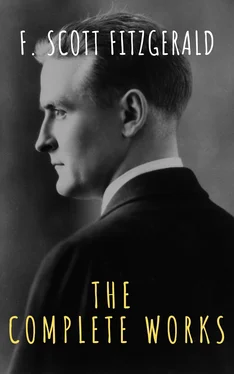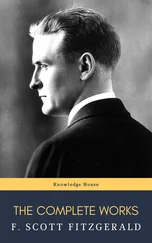“Your tan.”
“My tan?” She was puzzled. Her hand rose to her throat, rested there an instant as though the fingers were feeling variants of color.
“Do you remember Maury Noble? Man you met about a month ago. You made a great impression.”
She thought a moment.
“I remember—but he didn’t call me up.”
“He was afraid to, I don’t doubt.”
It was black dark without now and Anthony wondered that his apartment had ever seemed gray—so warm and friendly were the books and pictures on the walls and the good Bounds offering tea from a respectful shadow and the three nice people giving out waves of interest and laughter back and forth across the happy fire.
On Thursday afternoon Gloria and Anthony had tea together in the grill room at the Plaza. Her fur-trimmed suit was gray—“because with gray you have to wear a lot of paint,” she explained—and a small toque sat rakishly on her head, allowing yellow ripples of hair to wave out in jaunty glory. In the higher light it seemed to Anthony that her personality was infinitely softer—she seemed so young, scarcely eighteen; her form under the tight sheath, known then as a hobble-skirt, was amazingly supple and slender, and her hands, neither “artistic” nor stubby, were small as a child’s hands should be.
As they entered, the orchestra were sounding the preliminary whimpers to a maxixe, a tune full of castanets and facile faintly languorous violin harmonies, appropriate to the crowded winter grill teeming with an excited college crowd, high-spirited at the approach of the holidays. Carefully, Gloria considered several locations, and rather to Anthony’s annoyance paraded him circuitously to a table for two at the far side of the room. Reaching it she again considered. Would she sit on the right or on the left? Her beautiful eyes and lips were very grave as she made her choice, and Anthony thought again how naïve was her every gesture; she took all the things of life for hers to choose from and apportion, as though she were continually picking out presents for herself from an inexhaustible counter.
Abstractedly she watched the dancers for a few moments, commenting murmurously as a couple eddied near.
“There’s a pretty girl in blue”—and as Anthony looked obediently—” there! No. behind you—there!”
“Yes,” he agreed helplessly.
“You didn’t see her.”
“I’d rather look at you.”
“I know, but she was pretty. Except that she had big ankles.”
“Was she?—I mean, did she?” he said indifferently.
A girl’s salutation came from a couple dancing close to them.
“Hello, Gloria! O Gloria!”
“Hello there.”
“Who’s that?” he demanded.
“I don’t know. Somebody.” She caught sight of another face. “Hello, Muriel!” Then to Anthony: “There’s Muriel Kane. Now I think she’s attractive, ‘cept not very.”
Anthony chuckled appreciatively.
“Attractive, ‘cept not very,” he repeated.
She smiled—was interested immediately.
“Why is that funny?” Her tone was pathetically intent.
“It just was.”
“Do you want to dance?”
“Do you?”
“Sort of. But let’s sit,” she decided.
“And talk about you? You love to talk about you, don’t you?”
“Yes.” Caught in a vanity, she laughed.
“I imagine your autobiography would be a classic.”
“Dick says I haven’t got one.”
“Dick!” he exclaimed. “What does he know about you?”
“Nothing. But he says the biography of every woman begins with the first kiss that counts, and ends when her last child is laid in her arms.”
“He’s talking from his book.”
“He says unloved women have no biographies—they have histories.”
Anthony laughed again.
“Surely you don’t claim to be unloved!”
“Well, I suppose not.”
“Then why haven’t you a biography? Haven’t you ever had a kiss that counted?” As the words left his lips he drew in his breath sharply as though to suck them back. This baby !
“I don’t know what you mean ‘counts,’” she objected.
“I wish you’d tell me how old you are.”
“Twenty-two,” she said, meeting his eyes gravely. “How old did you think?”
“About eighteen.”
“I’m going to start being that. I don’t like being twenty-two. I hate it more than anything in the world.”
“Being twenty-two?”
“No. Getting old and everything. Getting married.”
“Don’t you ever want to marry?”
“I don’t want to have responsibility and a lot of children to take care of.”
Evidently she did not doubt that on her lips all things were good. He waited rather breathlessly for her next remark, expecting it to follow up her last. She was smiling, without amusement but pleasantly, and after an interval half a dozen words fell into the space between them:
“I wish I had some gum-drops.”
“You shall!” He beckoned to a waiter and sent him to the cigar counter.
“D’you mind? I love gum-drops. Everybody kids me about it because I’m always whacking away at one—whenever my daddy’s not around.”
“Not at all.—Who are all these children?” he asked suddenly. “Do you know them all?”
“Why—no, but they’re from—oh, from everywhere, I suppose. Don’t you ever come here?”
“Very seldom. I don’t care particularly for ‘nice girls.’”
Immediately he had her attention. She turned a definite shoulder to the dancers, relaxed in her chair, and demanded:
“What do you do with yourself?”
Thanks to a cocktail Anthony welcomed the question. In a mood to talk, he wanted, moreover, to impress this girl whose interest seemed so tantalizingly elusive—she stopped to browse in unexpected pastures, hurried quickly over the inobviously obvious. He wanted to pose. He wanted to appear suddenly to her in novel and heroic colors. He wanted to stir her from that casualness she showed toward everything except herself.
“I do nothing,” he began, realizing simultaneously that his words were to lack the debonair grace he craved for them. “I do nothing, for there’s nothing I can do that’s worth doing.”
“Well?” He had neither surprised her nor even held her, yet she had certainly understood him, if indeed he had said aught worth understanding.
“Don’t you approve of lazy men?”
She nodded.
“I suppose so, if they’re gracefully lazy. Is that possible for an American?”
“Why not?” he demanded, discomfited.
But her mind had left the subject and wandered up ten floors.
“My daddy’s mad at me,” she observed dispassionately.
“Why? But I want to know just why it’s impossible for an American to be gracefully idle”—his words gathered conviction—“it astonishes me. It—it—I don’t understand why people think that every young man ought to go down-town and work ten hours a day for the best twenty years of his life at dull, unimaginative work, certainly not altruistic work.”
He broke off. She watched him inscrutably. He waited for her to agree or disagree, but she did neither.
“Don’t you ever form judgments on things?” he asked with some exasperation.
She shook her head and her eyes wandered back to the dancers as she answered:
“I don’t know. I don’t know anything about—what you should do, or what anybody should do.”
She confused him and hindered the flow of his ideas. Self-expression had never seemed at once so desirable and so impossible.
“Well,” he admitted apologetically, “neither do I, of course, but—”
“I just think of people,” she continued, “whether they seem right where they are and fit into the picture. I don’t mind if they don’t do anything. I don’t see why they should; in fact it always astonishes me when anybody does anything.”
Читать дальше












